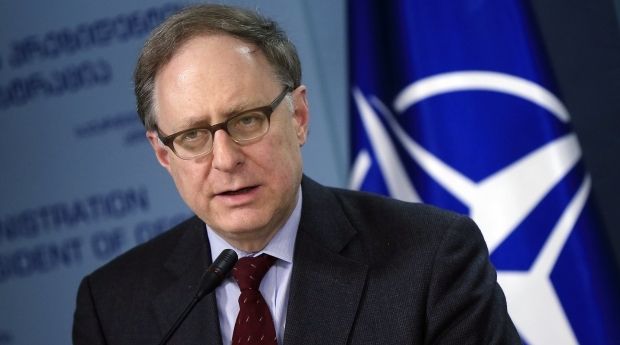
NATO is gearing up for its next summit. The Alliance's Brussels summit in July will take place against the backdrop of growing Transatlantic strains. Europe's chagrin over U.S. policies on the Iran deal, climate, and trade is mirrored by U.S. President Donald Trump's dissatisfaction with European allies' share of NATO defense spending.
Even in this difficult environment, the summit will beget progress on a number of areas, such as updating the NATO command structure; improving military readiness and mobility; and strengthening NATO training missions in Iraq and other Middle Eastern countries aimed at fighting terrorism, Alexander Vershbow, a Distinguished Fellow at the Atlantic Council, a former Deputy Secretary General of NATO, Assistant Secretary of Defense, and U.S. Ambassador to NATO and Russia, wrote in an article for RealClearWorld.
However, there is one concrete initiative that can unite allies across the Atlantic and bolster our collective security: strengthening NATO's partnership with Ukraine, Vershbow said.
Ukraine wants to join NATO. This is not immediately possible given the current security situation and the status of Ukraine's defense reforms, although it must remain on the table. For now, the Alliance can increase its cooperation with Ukraine independently of the membership question. While not a replacement for membership, inviting Ukraine to become an Enhanced Opportunities Partner is the natural next step in Kyiv's relationship with NATO.
Read alsoStoltenberg hopes Ukraine, Hungary able to find solution in language row
NATO launched the Enhanced Opportunities Partnership for Dialogue and Cooperation in 2014. Its goal was to strengthen the interoperability developed between allies and key partners in the aftermath of the ISAF mission in Afghanistan. EOP status is awarded to those partners which have most significantly contributed to NATO missions. The list of designated countries remains small, comprising Australia, Finland, Georgia, Jordan, and Sweden.
According to Vershbow, Ukraine does not count among them, but Kyiv has more than met the criteria needed to earn this designation. First of all, Ukraine pulls its weight in NATO missions. It has increased its contribution to the Resolute Support Mission, which provides training, advice and assistance for Afghan forces and institutions. Kyiv has been a significant contributor to allied operations in the Balkans and the Mediterranean, and it is one of just four non-members to contribute to the NATO Response Force, together with Georgia, Finland, and Sweden.
Ukraine currently contributes 5 percent of its gross domestic product to defense, more than any NATO ally. Four years of war against Russian-backed forces in the Donbas have forged the most battle-hardened troops on the European continent and bolstered a significant military-industrial sector. Ukrainian capabilities, knowledge, and technical expertise would be of significant value to the Alliance. No one else has as much knowledge of Russia as Ukraine, nor as much practical expertise in combatting Russian use of cyber-attacks, disinformation, and other forms of "hybrid warfare" aimed at undermining our democracies. Ukraine will also play a major role in Alliance efforts to strengthen its security in the Black Sea in order to protect NATO's southeastern flank, the author said.
Read alsoNATO PA declaration urges Allies to back Ukraine's membership hopes
EOP status would recognize that special relationship and take the partnership to the next level. It would bring Kyiv into more political consultations with NATO at the ambassadorial and working level, would grant it more access to exercises, and would increase information sharing. Far from being a one-way relationship, it would also significantly enhance NATO's expertise and operational skills. Some allies may be reluctant to support this step, but strong U.S. leadership could make it happen.
Debate within the Alliance on this issue has been deadlocked for several months by Hungary's refusal to agree to a meeting of NATO and Ukrainian heads of state during the Brussels Summit. Hungary has raised questions about the application of Ukraine's new Education Law to Hungarian-speaking minorities in Western Ukraine. In response, Kyiv has offered a series of measures to ensure that Hungarian speakers can continue to take courses in the Hungarian language at all levels while also mastering the state language, the expert stressed.
There are indications that Budapest may now be ready to delink this issue from the security and sovereignty of Ukraine and allow a heads-of-state meeting to take place, perhaps pairing Ukraine and Georgia since the latter also faces Russian threats to its sovereignty and territorial integrity. Such a meeting would be a positive move and would open the way to a favorable decision on granting EOP status to Ukraine. It would also deprive Russian propagandists of an opportunity to sow divisions between Ukraine and NATO.
The Trump administration has shown that it is willing to support Ukraine's security, not least through the recent decision to supply Javelin anti-tank missiles. Now Washington can show that it can unite NATO allies by further strengthening the Alliance's partnership with Ukraine, the main victim of Russian aggression. Ukraine has shown itself to be worthy of taking the next step in its relations with NATO. Granting Ukraine EOP status would not only be a symbolic reward for its hard work in support of the Alliance, but a boost for NATO's own security as well.

